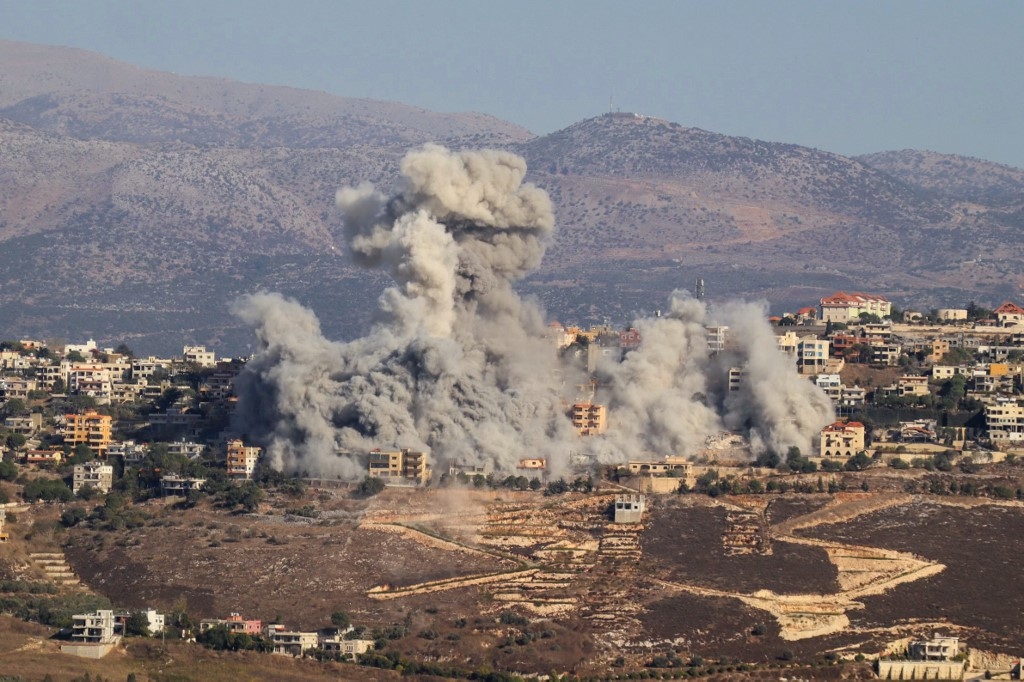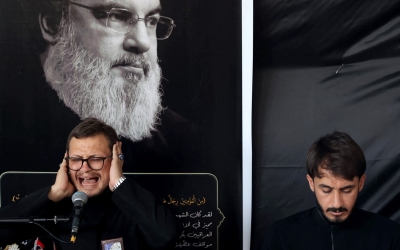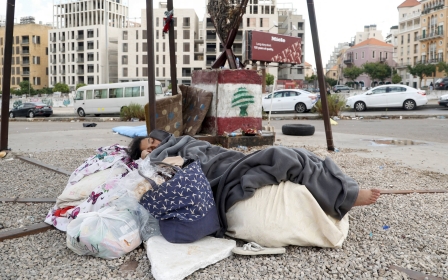Lebanese army fires on Israeli forces as Hezbollah strikes invading troops

The Lebanese army fired on Israeli troops in south Lebanon on Thursday, while Hezbollah claimed several significant attacks on invading soldiers.
Lebanese troops fired on Israeli forces after two of their soldiers were killed in separate incidents. It was the first time the official military has done so since Hezbollah and Israel began clashing in October 2023 over Israel's onslaught on Gaza.
One Lebanese soldier was killed and another wounded while taking part in an evacuation and rescue mission jointly with the Lebanese Red Cross, while a second was killed by an Israeli attack on a military post in the Bint Jbeil area of southern Lebanon.
The escalation comes as the death toll in Israel's attacks on Lebanon in the past year reached 1,974 people, including 127 children, the majority in the past week.
Lebanon’s health minister, Firass Abiad, said more than 40 first responders and firefighters have been killed by Israeli fire since Israel invaded Lebanon three days ago, while 97 “paramedics and firefighters” had been killed and 188 wounded since Hezbollah and Israel began exchanging fire on 8 October.
New MEE newsletter: Jerusalem Dispatch
Sign up to get the latest insights and analysis on Israel-Palestine, alongside Turkey Unpacked and other MEE newsletters
A Lebanese security source told Al Jazeera Arabic on Thursday that Hezbollah detonated a third explosive device against a force from Israel's elite Golani Brigade in the town of Maroun al-Ras.
According to Israeli media, helicopters were dispatched to areas along the Lebanon border where fighting is ongoing.
"In support of our steadfast Palestinian people in the Gaza Strip, in solidarity with their brave and honourable resistance, in defence of Lebanon and its people, and in response to the barbaric Israeli assault on cities, villages, and civilians, our fighters detonated a total of four explosive devices against the infiltrating Israeli enemy forces in the towns of Maroun al-Ras and Yaroun today, Thursday, from the early hours of dawn until 12 noon," a statement published by Hezbollah-linked media outlets said.
"These explosions caused significant and heavy losses among the enemy forces."
'Regional unrest'
Ongoing violence in the region has forced several airlines to suspend their flights to some Middle Eastern countries.
Emirates on Thursday announced that it had halted all flights to Iraq, Iran and Jordan for three days over “regional unrest”.
“Emirates is cancelling all flights to/from Iraq [Basra and Baghdad], Iran [Tehran], and Jordan [Amman] on 4th and 5th October due to regional unrest,” said the Dubai-based airline, which had previously halted flights between Dubai and Beirut until 8 October.
Iran has continued to trade barbs with Israel and the US in the wake of the launch of 180 ballistic missiles into Israel on Tuesday evening.
Though no fatalities were reported by the attack, Israel has vowed to retaliate.
Iran’s mission to the United Nations said that Tehran had warned the US it would attack again if Israel retaliated.
Iran said it exchanged messages with the US using the Swiss embassy in Tehran as an intermediary.
“Our response will be solely directed at the aggressor. Should any country render assistance to the aggressor, it shall likewise be deemed an accomplice and a legitimate target," Iran's mission said.
Concerned Gulf Arab officials told their Iranian counterparts they would remain neutral in the conflict between Iran and Israel, as they look to prevent spillover into their territories.
Reuters reported that ministers from Gulf Arab states delivered the message to Iran at a meeting of Asian nations hosted by Qatar, worried about potential Iranian attacks on their oil facilities.
"The Gulf states think it's unlikely that Iran will strike their oil facilities, but the Iranians are dropping hints they might from unofficial sources. It's a tool the Iranians have against the US and the global economy," Ali Shihabi, a Saudi commentator close to the royal court, told Reuters.
Middle East Eye delivers independent and unrivalled coverage and analysis of the Middle East, North Africa and beyond. To learn more about republishing this content and the associated fees, please fill out this form. More about MEE can be found here.





